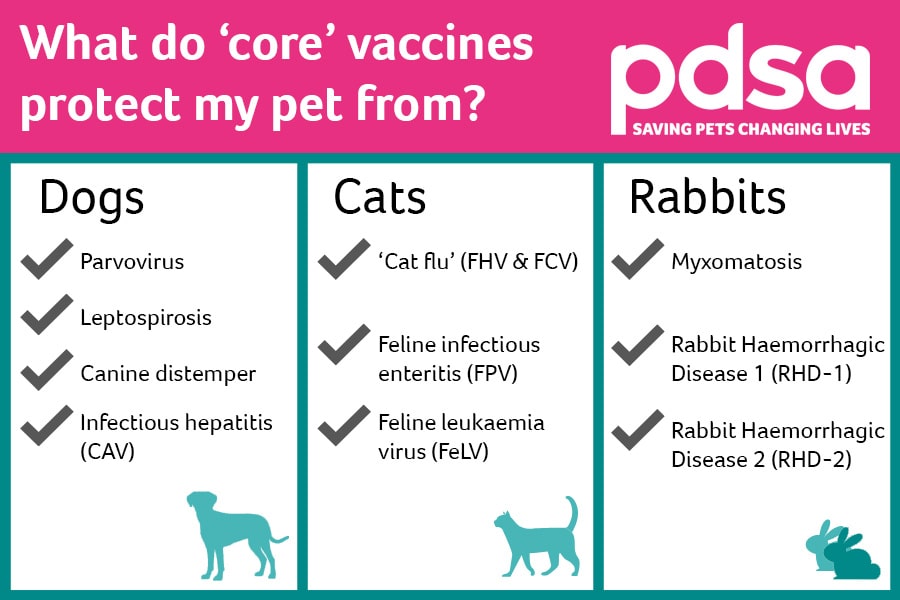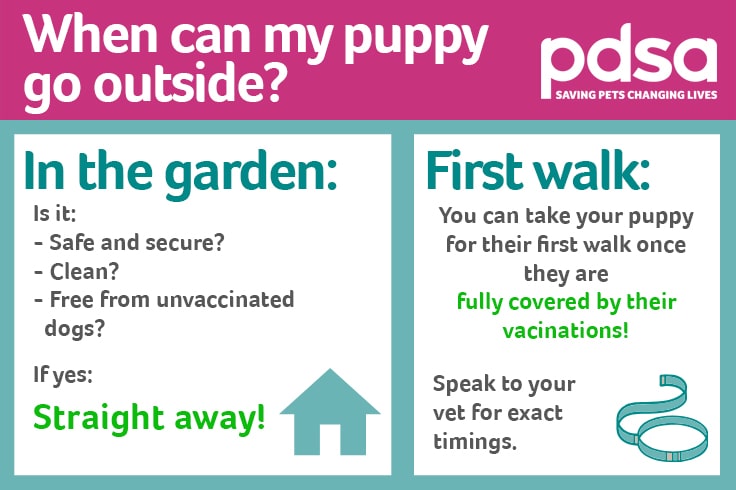Why vaccinate? Your questions answered
We all want the best for our pets, especially when it comes to keeping them healthy. There’s a lot of information out there about vaccinations and it can sometimes be confusing. Our vets have been answering some frequently asked questions on vaccinating pets.
If you’re worried about vaccinations or have any questions, it’s best to talk to your vet or vet nurse first. They’ll be able to give you advice specific to your pet.

Why do I need to vaccinate my pet?
Vaccinations are needed to
- Protect our pets from nasty, life threatening diseases
- Give peace of mind
- Create or boost our pets immunity to certain diseases
- Prevent pets from passing on a disease such as Leptospirosis, which can be passed from animals to people
Sadly, a lot of the diseases your pet can catch if they aren’t vaccinated are fatal in most cases. Even if your pet catches one and is able to recover, they will often be left with long-term problems which can put them through a lot of pain and distress and leave you with some costly vet bills.
If you’re thinking of going away with or without your pet, they will likely need to be vaccinated. Reputable catteries and boarding kennels will usually ask for proof that your pet’s vaccinations are up-to-date. If you plan on taking your pet abroad they’ll also need to be fully vaccinated. You’ll need to speak to your vet at least four months before travelling abroad with your pet to make sure they have all the paperwork needed.
What does my pet's vaccination cover?
Vaccinations will usually protect your pet from some of the most common diseases. What disease your pet’s vaccinations cover will depend on what kind of pet you have. Find out more on the pages below:


When should I vaccinate my pet? Will they need a booster?
Pets need to be vaccinated while they are young to protect them. Vaccination programmes for kittens and puppies start from around eight weeks old. Rabbits can have their vaccines from as early as five weeks.
Some adult pets may need to restart their first, or ‘primary’, vaccination course. This is usually the case when they’ve never been vaccinated, or you might not know if they have ever been vaccinated. Missed boosters also mean that your pet might need to start over with their vaccinations. Talk to your vet for advice on your pet’s needs.
After their first course, your pet will need regular boosters to keep them protected. Certain boosters usually need giving once a year, others less frequently. Your vet will be able to give you a vaccination plan specific to your pet so you can have peace of mind that they are covered.
When can my puppy or kitten go outside and mix with others?
It’s important to socialise your pet from a young age as it helps them develop happy, confident personalities. This means having lots of positive experiences with different people, animals and the everyday things they can expect throughout their lives.
Meeting other pets and people
Your kitten or puppy should generally be safe to mix with healthy, fully vaccinated pets within your own home. There is still a small risk of young pets getting germs from outside due to other pets or people bringing things in when they’ve have been out for walks, or people come to visit them. So during this time, it’s best to wash paws (and feet!) to stop any bugs being brought in.
At this stage, it’s best not to take your puppy or kitten to anyone else’s house. You can start socialising them with new things and people, but it’s best to keep this at your house until they are fully vaccinated.
Going outside
If you have a secure garden where other pets don’t go, your puppy should be able to explore your garden straight away. If you need to take your puppy or kitten out of the house, it’s best to use a carrier or something similar so they are kept off the floor. Once they’ve had all their vaccinations, your vet will be able to advise you when it’s safe for them to go outside and mix with other pets. Some vaccines take a little longer to build immunity than others, so ask your vet and follow their advice.
If you plan on giving your kitten free reign of the outdoors, it’s best to wait until they are fully vaccinated and neutered before letting them outside.

Do I need to vaccinate my older pet?
Just like young pets, our older pets are also at risk of catching diseases. As your pet gets older, they might not be quite as strong and find it difficult to get over illnesses. Being older doesn’t mean they are more resistant to disease – if anything, they are more at risk. It’s important that you continue to get your pet vaccinated regularly to protect them. If you adopt an older pet and you don’t know if they’ve ever had vaccinations, they can start a vaccination programme to suit them, just ask your vet.
Missed a booster vaccination – what should I do?
We’d always recommend making a note of when your pet is due for their booster somewhere you’ll remember (such as in a calendar, or set a reminder on your phone). This said, sometimes life gets in the way and you might accidentally miss your pet’s booster.
Try to book them in for their booster as soon as possible, especially if it’s not that far from when it was due. Speak to your vet as they will be able to give you the best advice.
If it has been too long since their booster was due, your vet might advise restarting their first vaccination course again. This is to make sure they’re fully protected – talk to your vet and follow their advice.
What about titre testing?
Titre testing is currently only available for dogs. It is a blood test that tells you whether your dog needs a booster vaccination or not. While this can be useful, it doesn’t replace the need for boosters completely and it doesn’t cover all diseases. You can read more about titre testing on our dog vaccinations page.
Why do pets have the same amount of vaccine, regardless of their size?
The vaccination dose isn't dependent on the size of your pet. The amount a vaccination bottle holds, is just the right amount to kick-start your pet's body into building up immunity to the disease being vaccinated against.
Vaccine FAQs

Are vaccinations necessary? These diseases are so rare now...
In the UK, we’ve been really good at vaccinating our pets. As a result of this, many of the diseases that we can protect against have become less common. However, our UK-wide research shows that more pets are going unvaccinated, especially when young. Sadly, since 2014 there has also been a steady increase in reported cases of distemper and parvovirus in the UK. These diseases can be devastating for the dogs that catch them.
Vaccination is the only way to keep these diseases from becoming too widespread.
Will vaccinations make my pet ill? Are vaccinations safe?
Vaccinations are developed and produced under very strict safety rules. They can’t be sold unless they’ve been licensed and proved to be safe and effective in use. The benefits of getting your pet vaccinated far outweigh any risks as serious reactions to vaccinations are extremely uncommon.
Some pets may have small reactions to vaccines, usually in the form of a little bump where the injection went in or some soreness. This will usually go away within a few weeks. For full information on vaccine reactions in pets, visit our PetWise Pet Health Hub.
Do I need to vaccinate my pet if they never go outside?
Even if your rabbit or cat doesn’t get out and about, it’s very likely that you do! So we still recommend that you give your pet their vaccinations. Many diseases can survive for a long time in the environment. You or other visitors can bring infections into the house on shoes and clothes. If other animals go in and out of the house then they can bring in infections on their fur or on their paws.
Speak to your vet as they’ll take your pet’s individual situation into account and come up with a vaccination plan based on this.
Can my pet still get ill if they are vaccinated?
Many diseases are caused by different infections or strains but we can only vaccinate against the most common ones. This is much like the flu jab in humans, where the most common strains are protected against. When your pet has their vaccines, if they come into contact with a rarer strain of the disease they can still contract that strain, but usually have milder symptoms. This means they will need less treatment and will have a far higher chance of survival than an unvaccinated pet.
Is it true that puppies and kittens get all the antibodies they need from their mother's milk, so don't really need vaccinations?
A mother feeding her young will provide some protection for the first few weeks of their lives. Once they are weaned off her milk, this natural protection starts to fade after a few weeks. This is when they’ll need to be vaccinated.
It’s important to remember that if mum hasn’t been vaccinated herself, then they may not even have this early protection. Young pets’ immune systems are not fully developed until they are around six months old, so when they catch diseases at this age, they can be fatal.

